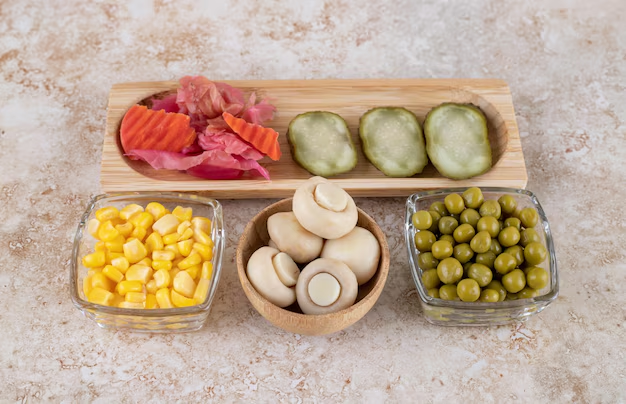Do Pickles Expire in the Refrigerator? Everything You Need to Know
Pickles, with their tangy, crunchy goodness, are a staple in many households. Over time, however, an intriguing question arises: Do pickles go bad in the refrigerator? While they are renowned for their long-lasting nature, there's more to know about their longevity, storage practices, and how to tell if they're no longer safe to consume. Let's explore the enticing world of pickles and uncover practical insights to keep your pickles at their best.
🥒 Why Pickles Last So Long
The Role of Preservation
Pickling is one of the oldest food preservation techniques, primarily relying on vinegar, salt, and sometimes sugar. These ingredients create an environment hostile to bacteria, mold, and other spoilage organisms, effectively extending the shelf life of the preserved items.
Factors Contributing to Longevity
- Acidity: The high acidity from vinegar preserves the pickles by lowering the pH, inhibiting microbial growth.
- Salt Content: Salt acts as a preservative and a crunch enhancer while creating an environment unsuitable for spoilage organisms.
- Refrigeration: Storing pickles in the refrigerator further slows down the growth of any potential spoilage microorganisms.
🥶 Storage Practices for Better Longevity
Proper Pickle Storage Techniques
- Sealed Containers: Always store pickles in their original containers with a tightly sealed lid to prevent air and other contaminants from entering.
- Cool Temperature: Keep pickles in the refrigerator to improve their shelf life. A cool and stable environment maintains their quality and taste.
- Avoid Contamination: Use clean utensils when handling pickles to prevent introducing bacteria into the container.
Assessing Shelf Life
- Commercial Pickles: These typically last longer due to pasteurization and preservatives. An unopened jar can last for years in a pantry and, once opened, several months in the fridge.
- Homemade Pickles: Without preservatives, they might have a shorter lifespan but can still last months when properly refrigerated.
🤔 Signs That Pickles Have Gone Bad
Visual and Sensory Indicators
- Smell: A sour or off-putting odor can indicate spoilage.
- Appearance: Look for signs of mold or unusual discoloration.
- Texture: Slimy or overly mushy pickles may be past their prime.
- Taste: A bad or off-flavor is a definitive signal to discard them.
Shelf Life Considerations
- Opened Jars: Usually remain good for up to two months or longer if stored properly in the refrigerator.
- Unopened Jars: Can last for a couple of years when stored in a cool, dark place. Always check the expiration date for guidance.
🔄 Related Refrigerator Topics
Extending the Life of Refrigerator Contents
- Cheese: Similar to pickles, cheese thrives in a cold, airtight environment. Wrap it in wax paper before refrigerating to extend its shelf life.
- Fruits and Veggies: Store ethylene-producing fruits such as apples separately from sensitive produce like lettuce to prevent premature spoilage.
Best Practices for Refrigerator Organization
- Top Shelves: Ideal for drinks and ready-to-eat foods as this is usually the warmest part.
- Middle and Lower Shelves: Perfect for dairy products like cheese and yogurt.
- Drawers: One for vegetables and one for fruits to manage humidity levels effectively.
- Door Storage: The warmest spot, so best suited for condiments rather than milk or eggs.
🗝️ Key Insights and Tips
Bullet Point Summary
- 🧊 Keep Cool: Store pickles in the refrigerator to maximize freshness.
- 🔥 Keep It Sealed: Ensure lids are tightly sealed to prevent contamination.
- 👀 Be Observant: Discard if there's mold, foul smell, or a rotten taste.
- 🛑 Use Clean Tools: Always use clean utensils when removing pickles to avoid introducing bacteria.
- ⏳ Longevity Awareness: Understand that commercial pickles last longer due to preservatives, while homemade options need careful monitoring.
Better Understanding of Food Safety
In the broader context of food safety, practices such as understanding how to properly store various food items in the refrigerator can significantly reduce waste and enhance the food's taste and safety for consumption. Prioritizing food storage is a small but mighty step towards a more sustainable kitchen environment.
Tying It All Together
In conclusion, while pickles are known for their resilience, they are not immune to spoilage. Understanding the characteristics and proper storage techniques can help ensure that your pickles remain delicious and safe for long-term enjoyment. As with all preserved foods, being vigilant about sensory changes helps you steer clear of consuming gone-bad pickles, ensuring every bite is as crunchy and tangy as it should be. Whether you're a pickle enthusiast or a casual fan, these insights empower you to keep your refrigerator organized and your pickles at their best.

